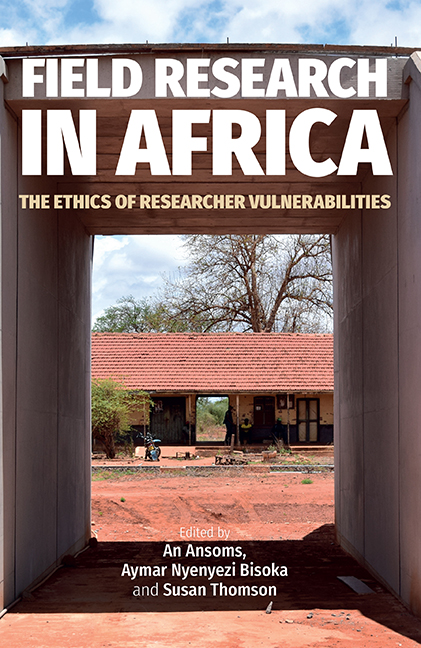Book contents
- Frontmatter
- Contents
- List of Contributors
- Foreword: It is about Us
- Map of Africa showing Fields of Research
- Introduction: Fields of Vision, Emotion as Reflexivity
- 1 Skin Connections: Negotiating Institutional Ethics alongside Insider Identities
- 2 Conducting Sensitive Research ‘At Home’: A Matter of Responsibility
- 3 A Gendered Research Journey: Ethical Dilemmas of an Algerian Immigrant Recovering the Memory of ‘Home'
- 4 Establishing Kinship in the Diaspora: Conducting Research among Fellow Congolese Immigrants of Cape Town
- 5 ‘If they find out, we're dead': Intermediaries, Self-censorship, and Anxiety in Research as an Outsider-Insider
- 6 Looking Behind the Screen: Ethical Quagmires when Accessing Hidden Discourses
- 7 Scholar-Activist? On Relational Accountability and an Ethic of Dissemination
- Conclusion: Theorising Self as Ethical Research Practice
- Bibliography
- Index
6 - Looking Behind the Screen: Ethical Quagmires when Accessing Hidden Discourses
Published online by Cambridge University Press: 10 June 2021
- Frontmatter
- Contents
- List of Contributors
- Foreword: It is about Us
- Map of Africa showing Fields of Research
- Introduction: Fields of Vision, Emotion as Reflexivity
- 1 Skin Connections: Negotiating Institutional Ethics alongside Insider Identities
- 2 Conducting Sensitive Research ‘At Home’: A Matter of Responsibility
- 3 A Gendered Research Journey: Ethical Dilemmas of an Algerian Immigrant Recovering the Memory of ‘Home'
- 4 Establishing Kinship in the Diaspora: Conducting Research among Fellow Congolese Immigrants of Cape Town
- 5 ‘If they find out, we're dead': Intermediaries, Self-censorship, and Anxiety in Research as an Outsider-Insider
- 6 Looking Behind the Screen: Ethical Quagmires when Accessing Hidden Discourses
- 7 Scholar-Activist? On Relational Accountability and an Ethic of Dissemination
- Conclusion: Theorising Self as Ethical Research Practice
- Bibliography
- Index
Summary
INITIALLY, I THOUGHT of ‘doing research’ as a process that could be compared to creating a kind of stage on which the researcher and the researched perform. I saw it as a somewhat artificial situation in which the researched is invited to share his/her story, discourse, or opinion with the researcher. At the same time, the researcher – through his/her scientific analysis – would give an interpretation to that story by framing it through a theoretical lens, by citing certain parts and omitting others, and by analysing it in relation to other stories, discourses, or opinions. In this view, both actors in the play know that they are part of an artificial theatre sketch and take into account how the other reads the situation.
Indeed, any researcher tries – in some way – to gain access to the participant's personal spheres by creating an atmosphere of safety and trust in which the research participant feels confident to share. At the same time, the researched also gathers information on the researcher, giving an interpretation to the researcher's perceived open and hidden agendas, and adapting his/her narrative to a particular image of how he/she wants to appear. As Brown (2009, 213) states, ‘researchers often forget that while we conduct fieldwork, we are ourselves the object of other people's research. A variety of actors are constantly gathering different types of information on us.’ The opinions based on the perceptions of the researched further impacts the research process (Fujii 2010; Wood 2006).
Researchers have written about how to deal ethically with the artificiality of the research theatre setting. How to gain consent (Thomson 2013a; Wood 2006)? How to build trust (Norman 2009)? How to interpret discourses and give priority to certain versions of truth over others (e.g., Fujii 2010; Robben 1995; Sanford 2006)? These questions have been debated at great length and in great detail by many scholars. Fewer scholars have written on the challenges of combining on-stage research life with off-stage personal life. Some interesting reflections exist on the way in which both lives influence each other. But what to do when doing research is no longer limited to a well-delineated period in which data are gathered for a particular purpose, for example for writing a particular book or article? What if research and personal life increasingly merge in a long-term trajectory?
- Type
- Chapter
- Information
- Field Research in AfricaThe Ethics of Researcher Vulnerabilities, pp. 105 - 116Publisher: Boydell & BrewerPrint publication year: 2021



